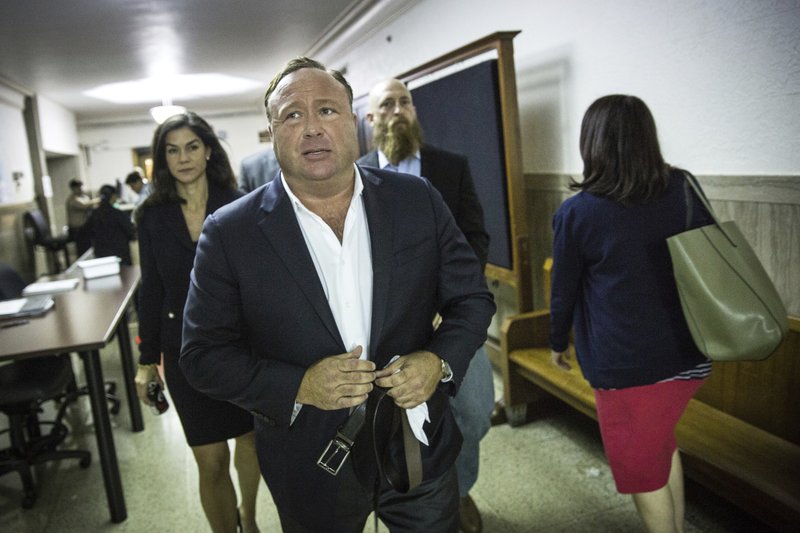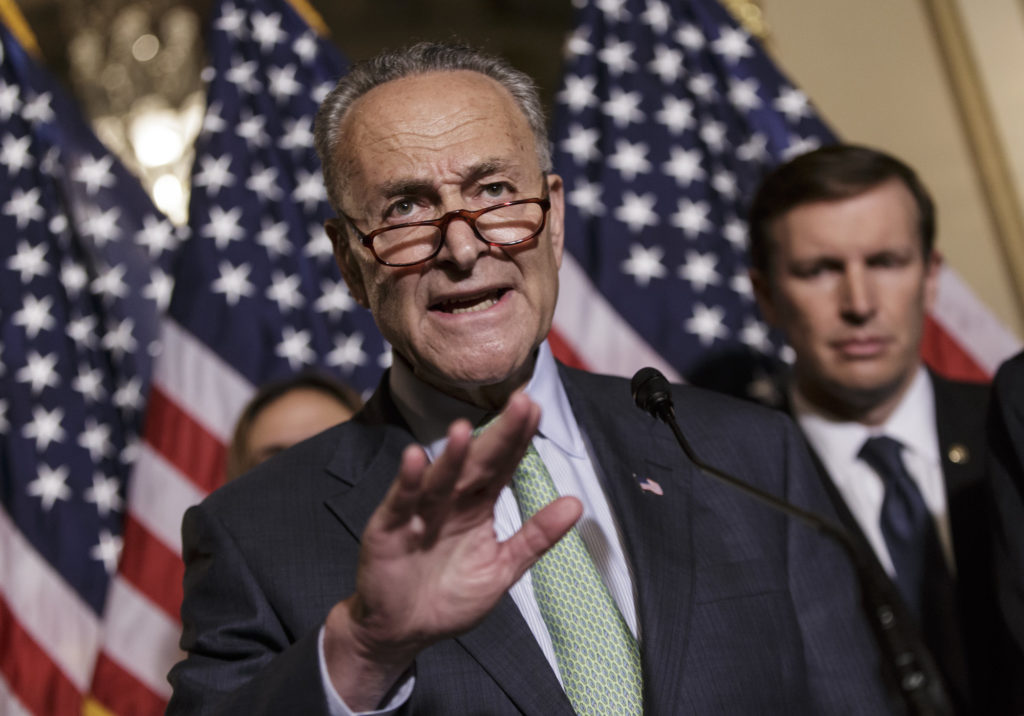Newtown schools ask Donald Trump to reject conspiracy theorists

Members of the Newtown Board of Education hoped a newly elected President Donald Trump would speak out against a famous conspiracy theorist and others who question the Sandy Hook Elementary School massacre. Two months later, they have yet to receive a response. The school board sent a one-page letter in February, asking Trump to denounce the lies because the comments of those who deny what happened are still hurting the community, said Keith Alexander, board chairman. The letter singled out Alex Jones, a radio host whose “Infowars” programming has alleged the massacre was a hoax. As a candidate, Trump voiced admiration for Jones during a December 2015 interview, telling Jones: “Your reputation is amazing. I will not let you down.” The school board wrote to Trump: “We are asking you to intervene to try to stop Jones and other hoaxers like him,” urging him to “clearly and unequivocally” recognize that 20 children and six adults were killed at the school more than four years ago. In response to questions from The Associated Press about the school board’s letter, the White House said: “President Trump has been quite clear that we, as a nation, are united in condemning hate and evil in all its forms.” Messages were left seeking comment with Jones through the Infowars website and the radio network that produces his show. Alexander said the school board had not heard back from Trump as of this week. “I do hope that we will receive a direct response at some point,” he said. In the days following the mass shooting, Trump used Twitter to express condolences to the Newtown families, saying it was “heartbreaking ” to see the photos of the young Sandy Hook victims and saying “it was a horrible day for Newtown, CT and our country.” Since the shooting on Dec. 14, 2012, several victims’ relatives have been accosted or harassed by conspiracy theorists, including some who say it was staged to erode support for gun rights. The question of how to address conspiracy theorists has been a sensitive one in Newtown. Many don’t want to talk about it publicly, fearing it will stir up more provocations. One parent whose child was killed at Sandy Hook, and who spoke on the condition of anonymity out of the fear of harassment, said many victims’ families opposed the letter being sent to Trump for that reason. Leonard Pozner, whose 6-year-old son Noah was killed in the shooting, once had a caller leave a voicemail message telling him: “You gonna die, death is coming to you real soon.” A Florida woman has been criminally charged in connection with voicemail and email threats to Pozner. A man accused of approaching the sister of slain Sandy Hook teacher Victoria Soto and angrily claiming the massacre hadn’t happened was sentenced a year ago to two years of probation. A Newtown teacher told a court in September that he had brought a weapon to school because he feared for his safety after receiving threats from conspiracy theorists. Pozner said he doubts the school board’s appeal to Trump will do much to sway anybody who believes the shooting that killed his son was some kind of hoax. “I don’t think the president can do anything about this conspiracy theory, even if he wanted to,” Pozner said. “The origin of conspiracy theories is a mistrust of government.” While he believes there is little any government official can do, Pozner has been working since 2015 to keep conspiracy theories from gaining such prominence on the internet. His HONR Network encourages the public to contact advertisers on Google and social networks to raise awareness of how ad revenue is being used to support false news. Alexander said the school board sent the letter in hope that it would help. “The town of Newtown suffered a tragedy that brought with it more than its own direct consequences and the comments of those who deny the events only further harm our community,” he said. “I believe the board of education action was intended to limit further harm from that behavior.” Republished with permission of The Associated Press.
A divided Senate answers Orlando with gridlock on gun curbs

A divided Senate blocked rival election-year plans to curb guns on Monday, eight days after the horror of Orlando’s mass shooting intensified pressure on lawmakers to act but knotted them in gridlock anyway — even over restricting firearms for terrorists. In largely party-line votes, rejected were one proposal from each side to keep extremists from acquiring guns and another shoring up the government’s existing system of required background checks for many firearms purchases. With the chamber’s visitors’ galleries unusually crowded for a Monday evening — including people wearing orange T-shirts saying #ENOUGH gun violence — each measure fell short of the 60 votes needed to progress. Democrats called the GOP proposals unacceptably weak while Republicans said the Democratic plans were overly restrictive. The stalemate underscored the pressure on each party to give little ground on the emotional gun issue going into November’s presidential and congressional elections. It also highlighted the potency of the National Rifle Association, which urged its huge and fiercely loyal membership to lobby senators to oppose the Democratic bills. “Republicans say, ‘Hey look, we tried,’” said Senate Minority Leader Harry Reid, of Nevada. “And all the time, their cheerleaders, the bosses at the NRA, are cheering them.” Senate Majority Leader Mitch McConnell, R-Ky., said the Orlando shootings — in which the FBI says the American-born gunman swore allegiance to a leader of the Islamic State group — show the best way to prevent attacks by extremists is to defeat such groups overseas. “Look, no one wants terrorists to be able to buy guns or explosives,” McConnell said. He suggested that Democrats were using the day’s votes “as an opportunity to push a partisan agenda or craft the next 30-second campaign ad,” while Republicans wanted “real solutions.” That Monday’s four roll-call votes occurred at all was testament to the political currents buffeting lawmakers after gunman Omar Mateen‘s June 12 attack on a gay nightclub. The 49 victims who died made it the largest mass shooting in recent U.S. history, topping the string of such incidents that have punctuated recent years. The FBI said Mateen — a focus of two terror investigations that were dropped — described himself as an Islamic soldier in a 911 call during the shootings. That let gun control advocates add national security and the specter of terrorism to their arguments for firearms curbs, while relatives of victims of past mass shootings and others visiting lawmakers and watching the debate from the visitors’ galleries. GOP senators facing re-election this fall from swing states were under extraordinary pressure. One, Sen. Kelly Ayotte of New Hampshire, voted Monday for the Democratic measure to block gun sales to terrorists, a switch from when she joined most Republicans in killing a similar plan last December. She said that vote — plus her support for a rival GOP measure — would help move lawmakers toward approving a narrower bipartisan plan, like one being crafted by Sen. Susan Collins of Maine. Monday’s votes came after Sen. Chris Murphy, D-Conn., led a near 15-hour filibuster last week demanding a Senate response to the Orlando killings. Murphy entered the Senate shortly after the December 2012 massacre of 20 first-graders and six educators in Newtown, Connecticut, but that slaughter and others have failed to spur Congress to tighten gun curbs. The last were enacted in 2007, when the background check system was strengthened after that year’s mass shooting at Virginia Tech. With Mateen’s self-professed loyalty to extremist groups and his 10-month inclusion on a federal terrorism watch list, Sen. Dianne Feinstein, D-Calif., proposed letting the government block many gun sales to known or suspected terrorists. People buying firearms from federally licensed gun dealers can currently be denied for several reasons, chiefly for serious crimes or mental problems, but there is no specific prohibition for those on the terrorist watch list. That list currently contains around 1 million people — including fewer than 5,000 Americans or legal permanent residents, according to the latest government figures. No background checks are required for anyone buying guns privately online or at gun shows. The GOP response to Feinstein was an NRA-backed plan by Sen. John Cornyn, R-Texas. It would let the government deny a sale to a known or suspected terrorist — but only if prosecutors could convince a judge within three days that the would-be buyer was involved in terrorism. The Feinstein and Cornyn amendments would require notification of law enforcement officials if people, like Mateen, who’d been under a terrorism investigation within the past five years were seeking to buy firearms. Republicans said Feinstein’s proposal gave the government too much unfettered power to deny people’s constitutional right to own a gun. They also noted that the terrorist watch list has historically mistakenly included people. Democrats said the three-day window that Cornyn’s measure gave prosecutors to prove their case made his plan ineffective. The Senate rejected similar plans Feinstein and Cornyn proposed last December, a day after an attack in San Bernardino, California, killed 14 people. Murphy’s rejected proposal would widely expand the requirement for background checks, even to many private gun transactions, leaving few loopholes. Senate Judiciary Committee Chairman Charles Grassley of Iowa, defeated plan increased money for the background check system. Like Murphy’s measure, it prodded states to send more records to the FBI, which operates the background check system, of felons and others barred from buying guns. Grassley’s proposal also revamped language prohibiting some people with mental health issues from buying a gun. Democrats claimed that language would roll back current protections. Monday’s votes were 53-47 for Grassley’s plan, 44-56 for Murphy’s, 53-47 for Cornyn’s and 47-53 for Feinstein’s — all short of the 60 needed. Separately, Collins was laboring to fashion a bipartisan bill that would prevent people on the no-fly list — with just 81,000 names— from getting guns. There were no signs Monday that it was getting wide support or would receive a vote. Republished with permission of The Associated Press.


